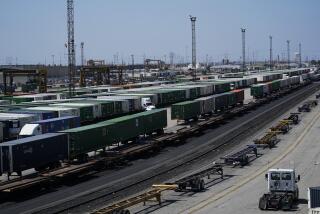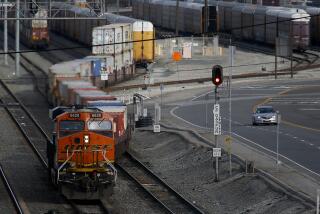Businesses Balk at Implementing Proposed Traffic Reduction Plan : Environment: Countywide program to help reduce air pollution calls for employers to entice workers out of their cars and into buses and car pools.
- Share via
Business leaders who have been tabbed as the first to launch a countywide traffic reduction program protested Wednesday that the burden of cleaning up the air and reducing traffic congestion should not rest on their shoulders alone.
At hearings conducted by the San Diego County Air Pollution Control District in North County and in Mission Valley, spokesmen for business and industry asked: “Why pick on us?”
The answer, according to district’s deputy director Paul Sidhu, is that employers and their employees are the largest group of highway users, responsible for one-third of the county’s daily automobile trips, more than one-half the amount of miles driven and nearly 40% of the emissions spewed into the air by motor vehicles.
Even though the county pollution control agency, headed by the Board of Supervisors, has removed some of the more expensive and time-consuming requirements of the countywide traffic reduction plan, employers still face the unpleasant task of forcing their employees out of their cars and into buses, van pools and car pools in order to meet state-imposed requirements to clean up the atmosphere.
Under the traffic reduction program scheduled to go into effect next January, employers will be required to subsidize their employees’ transit fares or car-pool and van-pool costs. Employees who walk or bicycle to work also will be reimbursed.
If the enticements of subsidies fail to do the job by 1994, employees who continue to drive alone to work will face parking fees starting at $30 a month and rising to $100 a month by 1997.
A South Bay business leader drew applause when he suggested that no attempt should be made to impose constraints on automobile drivers until an adequate mass transit system is in place countywide.
In fact, he added, why not use the millions of dollars that the traffic reduction program will cost on mass transit “instead of building a massive bureaucracy we’ll never get rid of?”
Currently, he said, “a marathon runner can get to work before I can.”
A spokeswoman for the Greater San Diego Chamber of Commerce said the organization favored a traffic control program that would effect equally all county drivers, not just employees. She said that the traffic reduction program could cause severe hardship on an economy already hurt by the recession.
An attorney for Home Depot stores questioned the constitutionality of the air pollution control district’s proposed fee and penalty provisions, while a Navy captain pointed out that the federal government will not permit charging parking fees to military personnel and federal employees without the blessing of the U.S. General Services Administration.
Wednesday’s hearings drew about 150 people and much less comment than hearings in May that resulted in reducing the paperwork required of employers and postponing fees and penalties required of employers who fail to meet goals in reducing the number of solo commuters in their employ.
About 12,000 businesses will be placed under the district’s program within the next four years. Employers of 50 or more workers will implement the program next January; firms employing 25 to 49 workers will start in January, 1993; firms with 11 to 24 employees will begin in January, 1994. Each firm will have two years to meet its goals before penalties and parking fees are imposed.
Two more hearings will be held today in El Cajon and Chula Vista to receive further public comment. A final hearing has been scheduled for Sept. 17, after which the county Board of Supervisors will adopt a traffic reduction plan.
More to Read
Sign up for Essential California
The most important California stories and recommendations in your inbox every morning.
You may occasionally receive promotional content from the Los Angeles Times.










